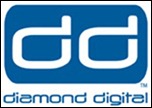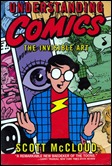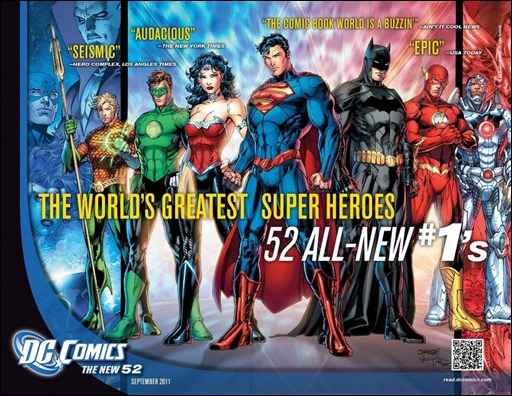DC Comics’ newest marketing strategy to energize their sales and possibly make them the top comics publisher not only includes a relaunching of their Universe, but a strong push into digital distribution as well. Their day-and-date publishing – releasing digital copies of print books on the same day of release – is their current foray into digital distribution. While a few other publishers currently do day-and-date digital, their main competitor, Marvel Comics, delays their digital copies by at least 9 months in deference to comic book retailers who had feared that this policy would hurt their print sales.
With this new tactic, DC hopes to increase their previously waning market share and capture a market that is beginning to grow since the introduction of the iPad and other tablet devices. They are hoping that the convenience of purchasing books digitally at the same time as print releases, will put them at the forefront of the digital market.
Diamond Gets In On The Act
Diamond Comics Distributors is also getting in on the digital action. Beginning in August, Diamond Digital will begin beta testing at participating retailers. Diamond plans to roll out their digital sales in September 2011 with about 30 publishers – including IDW Publishing, Image Comics, Archie, NBM/Papercutz, and Top Shelf – participating in their endeavor.
Although Diamond Digital will go day-and-date, there is a major difference on going about obtaining the digital copy. According to Diamond, comics retailers will benefit from their sales. A customer can either go to a retailer and purchase a printout of a unique code that they can enter at Diamond’s website to receive the copy or they can go to the retailer’s website and buy it on there instead. Once the customer redeems their code, the retailer will then be charged 67% of the cover price, thus letting them keep 33% of the money they collected. This is a lower percentage than what they would normally get on a print copy, but the sale has already been guaranteed.
So what does this all this digital talk mean to the brick and mortar local comics shop? It means hold on tight, it’s going to be a rough ride.
For the most part, the digital frontier is basically an unknown and fully exploitable territory. All it takes is the right vision to take control and profit from it. But they have to watch out and not throw the Local Comics Shop under the bus while they explore their digital options.
Many monthly comics buyers I know, myself included, prefer an actual print copy. There’s a different sensation to reading a hard copy that you hold in your hand and are able to flip through that doesn’t come across in the digital copy. You can store them for your future generations, you can sell them and subsidize future purchases, or you can hold on to them for speculation in hopes of selling them at a much greater return as an investment.
While digital copies don’t possess a true ‘monetary value,’ you can always pass them down – IF the technology of the time allows and IF the companies housing your copies still exist. The most attractive features to digital buyers really is just convenience of purchase and portability. Once you get past those two points, there really isn’t much else that makes them better than print mainly because the cost of digital and print is usually the same.
Pricing Concerns
This is where the situation gets sticky.
If they make the digital price point significantly lower than the print price, they’ll take a chance at increasing sales digitally by possibly cannibalizing their print sales. If their print sales go down, so do retailer sales, and there’s a chance that retailers may suffer or go out of business and therefore the publisher loses another avenue for revenue. This is not a good business model to promote, especially in the very small market that exists today.
Now if a publisher keeps the price points on both versions the same, the only customers who will cross over to digital will be those who prefer convenience and portability over what a print copy offers; those that just want to read a story and not have to worry about storing a physical copy. In this scenario, the publisher has more to gain due to the fact that they don’t have to actually print and ship the issue, therefore saving on the cost to create a comic.
The Real Concern
The main problem I see in this race to digital is that all the players involved are looking to get their piece of the pie, yet it’s the same pie that’s always existed. Instead of trying to promote the medium of comic books as a mainstream form of entertainment and learning, they are just trying to pull sales from one format to another without increasing the revenue stream. When you increase sales in a relatively niche market, you’re more than likely pulling more revenue from the same sources that have existed; current customers are spending more on titles. If something drastic were to happen to their incomes, then the resulting market shrink would adversely affect the industry. That’s a scary scenario in our current economic times.
The comics industry would benefit greatly if they actually formed a coalition or initiative in order to promote comics books to a wider audience.
A vast majority of people who read books don’t read comics. Why? Are books better because they don’t have pictures in them? Are comics, like many cartoons, perceived as a child’s form of entertainment that adults have evolved beyond? These are questions that need answers and solutions in order for the market to survive into the future.
Only a collective industry wide campaign would garner enough resources to have a chance at achieving a realistic goal of defeating apathy or disdain for the comics medium. Top names within the industry, and those that transcend it, could be recruited to promote this idea: Stan Lee, Neil Gaiman, Warren Ellis, Gail Simone, Grant Morrison, Alan Moore, and Frank Miller just to name a few.
Just like the boundaries are pushed within the pages of comics, so must the boundaries of the market be pushed; not just in the format of the titles published, but the ideals of what makes comics what they are. Scott McCloud does a wonderful job explaining what a comic book really is in his book Understanding Comics. If more people grasped the ideas contained in that essential read, the doors would blow off in this industry and we wouldn’t be worrying about what form comics will take in the future.
This is a proposal that I hope that people in the industry at least begin to talk about and discuss amongst their peers.
What We All Can Do
This is a medium that I, and many people, would hate to see minimized and discarded due to apathy. Remember, we can all help to promote the things we love to those who have never experienced it; whether it’s music, movies, TV shows, or comics, it makes no difference. All it takes is word of mouth and the willingness to commit to what you believe in. If one reader can convert at least one of every 30 people he talks to about comics, that’s a plus for everyone.
What do you say? Are you willing to spread the word about the true value of the medium? I say – Go for it!
– The Comic Book Critic



Interesting article. For me, I have no interest in digital copies if there isn’t a significant price break along with it. But that’s me, I’d rather make a little on a lot than a lot on a little.
I also don’t see them as a replacement to the hardcopies I buy, it’s above and beyond what I normally get each month.
The industry will have to move in the digital direction though, the generation behind me will demand it.
Imagine th music industry today if they had of insisted years ago -like they are for comics now – that you don’t actually get a copy of the song, it is just stored on some other company server that may or may not exist tomorrow.
For that reason alone, DC attempt to go digital will fail so miserably that the company as well may go away.
Nobody is spending $3-4 to be told they don’t even own a digital copy.
I as well see huge future lawsuits over this issue should some of these servers close down and customers no longer having access to their purchases.
Not to mention customer frustration of being told constantly due to upgrades they need to redo their issues like comixology does and the bandwidth issues this causes.
DC almost had it right… too bad.
With digital, it’s a slippery slope to distribute content. Since it’s an exact reproduction in digital form, it makes it easy to copy and distribute if you own a digital copy. One way publishers can try to prevent distribution is by adding Digital Rights Management (DRM) to prevent anyone but the owner from viewing it.
We all know what a fantastically horrible idea DRM is, both in music and in video games.
Another way is to keep the copies on their servers and allow viewing by the original owner. Than in itself is a form of DRM, just not an embedded form.
I don’t have an answer for what they will eventually decide on, but I know that I, myself, would never pay for a comic, TPB, or GN that I don’t personally own – print or digital.
Just like the movie industry originally fought to limit Beta and VHS sales siting lost sales and profits, and how the RIAA successfully lobbied Congress against Digital Audio Tape in the ’80s effectively killing the format for consumers, we’ll find out that certain industries fighting for profits aren’t a good thing.
Companies have to realize that if you put out a good product, people will put down their hard earned money for that product. Those who don’t want to pay for it will always find avenues in which to get it for free. So put out DRM free copies for your consumer, let those people have a copy on their computer that they can copy onto an many devices as they have, and let them do what they want with what they paid for. Don’t treat your customers like potential criminals.
Trey Parker and Matt Stone let everyone view every episode of South Park on their website. They do so because they have faith in their product and know that if more people are exposed to it and like it, they will spend their money on purchasing the DVDs. That’s a business model many can take a hint from.